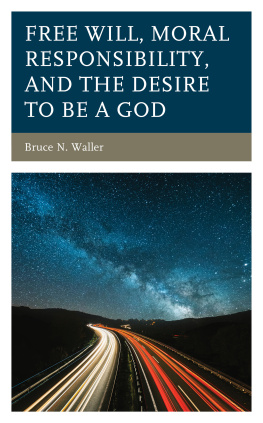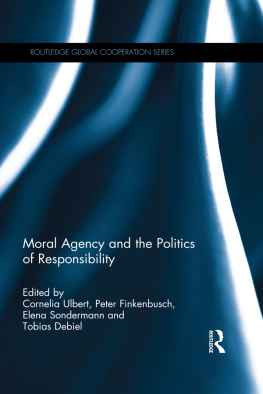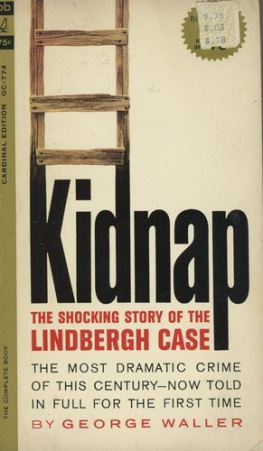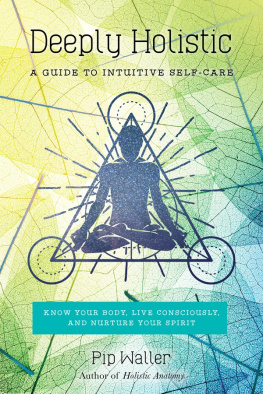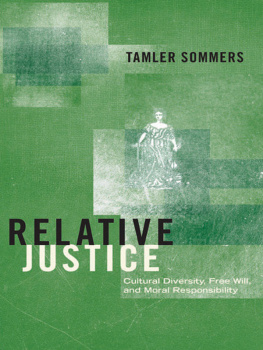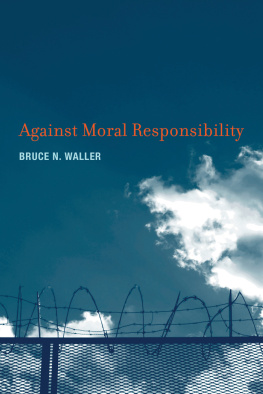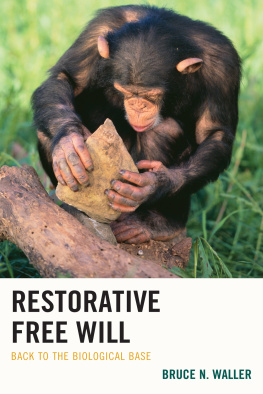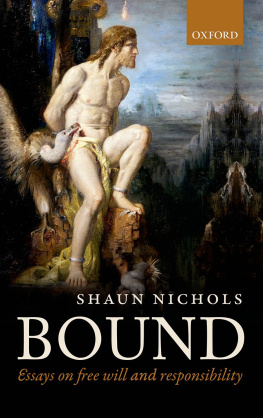By Bruce N. Waller - Free Will, Moral Responsibility, and the Desire to Be a God
Here you can read online By Bruce N. Waller - Free Will, Moral Responsibility, and the Desire to Be a God full text of the book (entire story) in english for free. Download pdf and epub, get meaning, cover and reviews about this ebook. year: 2012, publisher: Lexington Books, genre: Religion. Description of the work, (preface) as well as reviews are available. Best literature library LitArk.com created for fans of good reading and offers a wide selection of genres:
Romance novel
Science fiction
Adventure
Detective
Science
History
Home and family
Prose
Art
Politics
Computer
Non-fiction
Religion
Business
Children
Humor
Choose a favorite category and find really read worthwhile books. Enjoy immersion in the world of imagination, feel the emotions of the characters or learn something new for yourself, make an fascinating discovery.
- Book:Free Will, Moral Responsibility, and the Desire to Be a God
- Author:
- Publisher:Lexington Books
- Genre:
- Year:2012
- Rating:3 / 5
- Favourites:Add to favourites
- Your mark:
- 60
- 1
- 2
- 3
- 4
- 5
Free Will, Moral Responsibility, and the Desire to Be a God: summary, description and annotation
We offer to read an annotation, description, summary or preface (depends on what the author of the book "Free Will, Moral Responsibility, and the Desire to Be a God" wrote himself). If you haven't found the necessary information about the book — write in the comments, we will try to find it.
Free Will, Moral Responsibility, and the Desire to Be a God — read online for free the complete book (whole text) full work
Below is the text of the book, divided by pages. System saving the place of the last page read, allows you to conveniently read the book "Free Will, Moral Responsibility, and the Desire to Be a God" online for free, without having to search again every time where you left off. Put a bookmark, and you can go to the page where you finished reading at any time.
Font size:
Interval:
Bookmark:
Free Will, Moral Responsibility,
and the Desire to Be a God
Free Will, Moral Responsibility,
and the Desire to Be a God
Bruce N. Waller
LEXINGTON BOOKS
Lanham Boulder New York London
Published by Lexington Books
An imprint of The Rowman & Littlefield Publishing Group, Inc.
4501 Forbes Boulevard, Suite 200, Lanham, Maryland 20706
www.rowman.com
6 Tinworth Street, London SE11 5AL, United Kingdom
Copyright 2020 by The Rowman & Littlefield Publishing Group, Inc.
Iqbal, Muhammad. 2000. Tulip in the Desert. Translated by Mustansir Mir. Lahore,
Pakistan: Iqbal Academy. Used with permission.
All rights reserved. No part of this book may be reproduced in any form or by any electronic or mechanical means, including information storage and retrieval systems, without written permission from the publisher, except by a reviewer who may quote passages in a review.
British Library Cataloguing in Publication Information Available
Library of Congress Cataloging-in-Publication Data
Library of Congress Control Number: 2020027747
ISBN: 978-1-7936-3264-7 (cloth : alk. paper)
ISBN: 978-1-7936-3265-4 (electronic)
 TM The paper used in this publication meets the minimum requirements of American National Standard for Information SciencesPermanence of Paper for Printed Library Materials, ANSI/NISO Z39.48-1992.
TM The paper used in this publication meets the minimum requirements of American National Standard for Information SciencesPermanence of Paper for Printed Library Materials, ANSI/NISO Z39.48-1992.
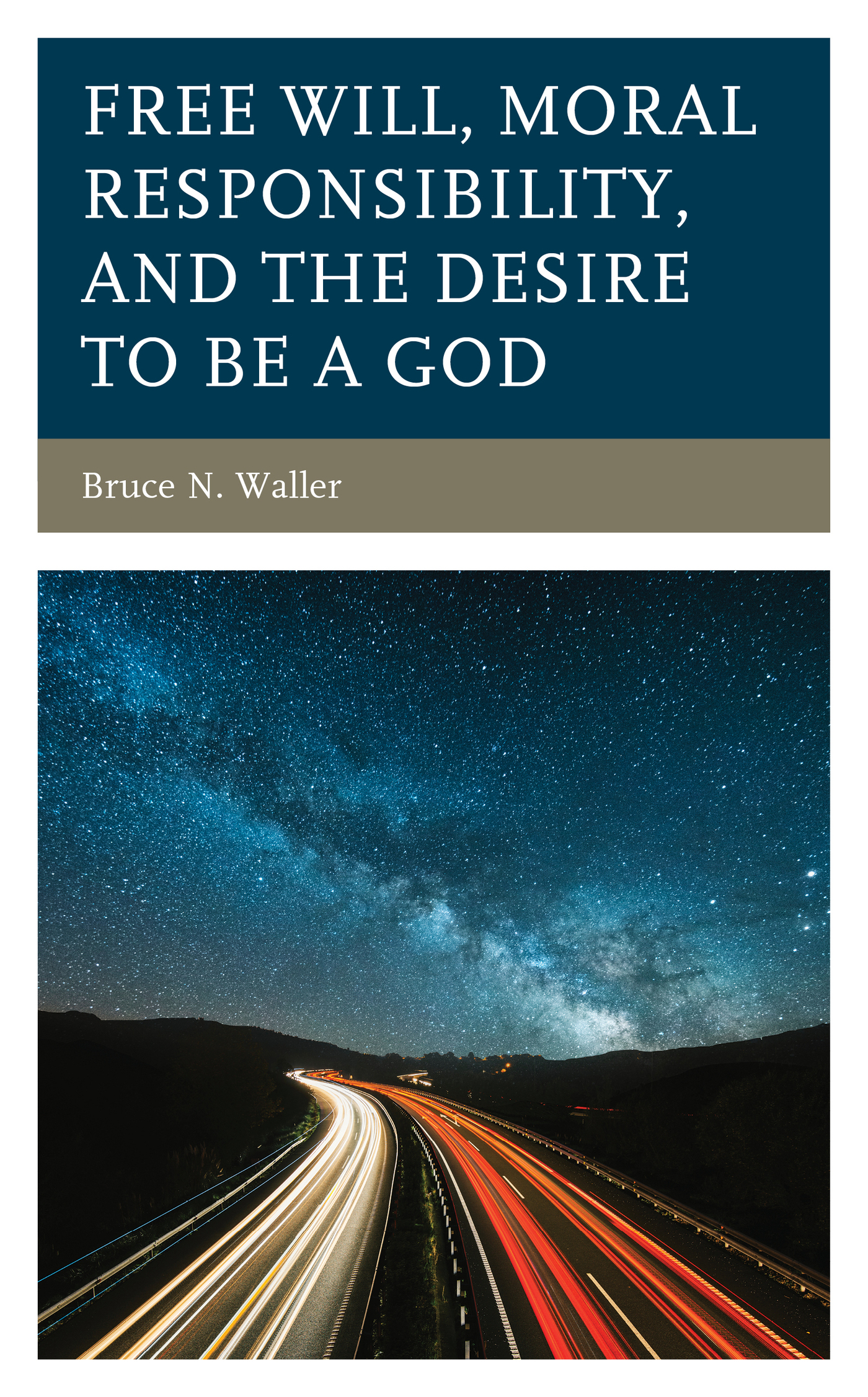
I am indebted to many philosophers, psychologists, and legal scholars
many of whom would consider themselves among the loyal opposition, but all have provided valuable insights into the material covered in this book. Very special thanks to Peter Alces, Tom Clark, Michael Corrado, Dan Dennett, Richard Double, Farah Focquaert, Robert Kane, John Lemos, Gerald Massey, Elizabeth Shaw, and Saul Smilansky. Gregg Caruso read the entire manuscript and made excellent suggestions for improvements. For the benefit of their philosophical reputations, I hasten to add that none of them should be assumed to agree with anything whatsoever in this book.
I am fortunate to have spent my academic career in a stimulating and supportive department, among people with profound understanding of many different areas of study who have been generous in sharing their knowledge: Chris Bache, Robyn Gaier, Michael Jerryson, Brendan Minogue, Mustansir Mir, Deborah Mower, Gabriel Palmer-Fernandez, Tom Shipka, Linda Tess Tessier, Alan Tomhave, and Mark Vopat. Special thanks also to the amazing departmental administrators, Joan Bevan, Mary Dillingham, and Linda Glover, who kept the department running very smoothly and efficiently, even during my woefully inept decade as department chair. My students at YSU have inspired me with their dedication, energized me with their genuine delight in philosophy, and often amazed me with their insights.
A special pleasure of the academic life is having lunch with friends from a variety of disciplines and perspectives, and I am grateful for the enjoyment and the enlightenment I have had from many lunches with Alan Jacobs, Jane Kestner, Ikram Khawaja, Jim Morrison, Tod Porter, and Charles Singler.
I have also benefited from years of stimulating luncheon conversations with Fred Alexander, Luke Lucas, and Lauren Schroeder, concerning everything from ancient warfare to comparative religion to contemporary art, with fascinating detours into the real perils of drawing to an inside straight and the negligible danger of being struck by a falling tree.
Thanks to Homer Warren and Linette Stratford for wonderful conversations and for introducing me to Producer Consciousness, and to Lia Ruttan for her anthropological and ethical insights.
Special thanks to all the strange and wonderful members of the McCauley Street Gang from my Chapel Hill graduate school days, who have enlightened me on everything from the architectural design of colonial-era barns to the origins of the U.S. Navy on Lake Champlain.
Many thanks to Jana Hodges-Kluck, Sydney Wedbush, Nicolette Amstutz, and all the very able, efficient, and friendly folks at Lexington Publishing.
Finally, my greatest debt and greatest joy is my family: my son Russell and his wife, Robyn, and their two wonderful children, Nathanael and Josephine; my son Adam and his husband, Joshua; our loving and playful poodle, Maggie; and my wife, Mary, a dedicated and brilliant psychologist who joyfully takes on the toughest cases, including me.
Free Will, Moral Responsibility, and the Desire to Be a God developed out of a long quest to understand the deep and enduring commitment to moral responsibility, and a slowly developing recognition that moral responsibility is part of a much larger system of belief. The nature of that system and its strengths and interconnections are a fascinating but difficult study: key elements of the system (such as belief in a just world) operate nonconsciously; other elements (such as the desire to strike back at harms) are deep motives that influence us in ways we rarely understand; and parts of the systemsuch as our conception of free will, the model we have of human reason, and our view of will powerare heavily influenced by the roles they play in the larger system. Biological and psychological research on the various elements of the moral responsibility system helps explain how these parts fit together into a systematic whole, and why the system is so strong that it seems unassailable.
Though this book poses some challenges for the moral responsibility system, it is not an effort to refute moral responsibility. Many excellent books have undertaken that task, including Derk Perebooms Living Without Free Will (2001), Neil Levys Hard Luck (2011), and Gregg Carusos Free Will and Consciousness (2012) and Rejecting Retributivism: Free Will, Punishment, and Criminal Justice (2021); and I have given it my best shot in Freedom Without Responsibility (1990) and Against Moral Responsibility (2011). Instead, this is an attempt at a better understanding of the moral responsibility system, its enduring charms, and its tough resilience.
Many of the charms of the moral responsibility system are obvious. We have a powerful desire to strike backor more precisely, pass the pain alongwhen we suffer harm, and the moral responsibility system legitimizes that desire. We have a deep (though generally nonconscious) belief in a just world, and moral responsibility provides vital protection for that belief: the apparently unjust suffering of unfortunate innocents is explained away (the supposed innocents are actually guilty, and are receiving their just deserts); the disproportionate benefits enjoyed by the privileged are the justly deserved reward for their virtues; and the punishment we inflict becomes the virtuous exercise of giving morally responsible miscreants what they justly deserve. Still, there seems to be more to the moral responsibility system than these dubious attractions: something that makes it attractive to many who are not eager to use moral responsibility for the conventional purposes of promoting retribution, justifying punishment, and vindicating inequitable benefits for the privileged. There seems to be some dark matter that binds the system together and makes it difficult to challenge and hard to renounce. That dark force is apotheosis aspiration: the deep desire to be a god, or at least to have distinctive godly attributes that make us very special and wonderfully unique. Apotheosis aspiration is rarely conscious, commonly and vehemently denied, and afflicts both believers and nonbelievers alike. It is deep in our myths, central to our common sense self-image, and enmeshed in our institutions. This book is an attempt to examine the dark matter of apotheosis aspiration, expose it to scrutiny, and explore the links between apotheosis aspiration and the other elements of the powerful apotheosis aspiration system.
Next pageFont size:
Interval:
Bookmark:
Similar books «Free Will, Moral Responsibility, and the Desire to Be a God»
Look at similar books to Free Will, Moral Responsibility, and the Desire to Be a God. We have selected literature similar in name and meaning in the hope of providing readers with more options to find new, interesting, not yet read works.
Discussion, reviews of the book Free Will, Moral Responsibility, and the Desire to Be a God and just readers' own opinions. Leave your comments, write what you think about the work, its meaning or the main characters. Specify what exactly you liked and what you didn't like, and why you think so.

